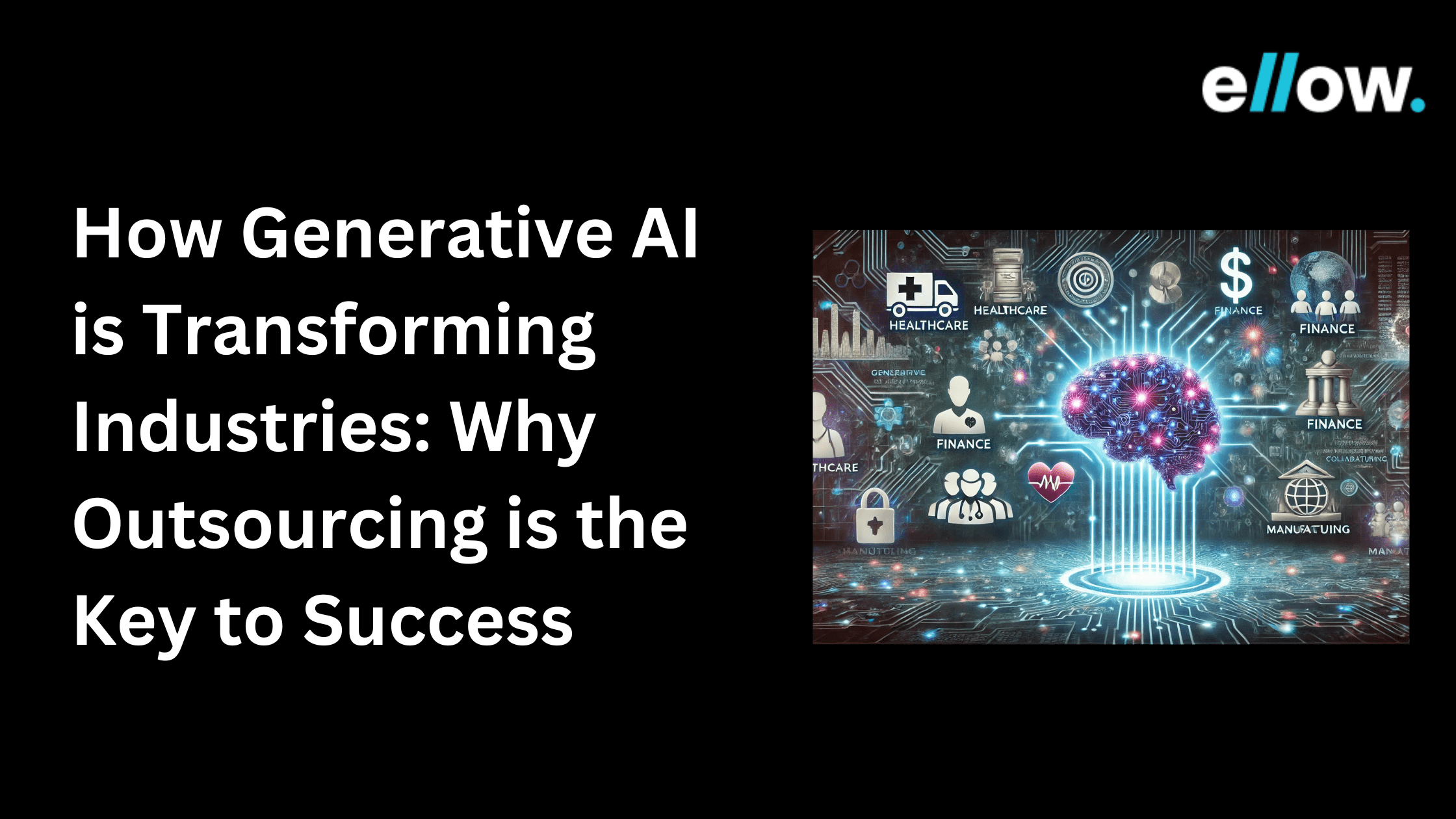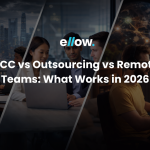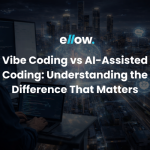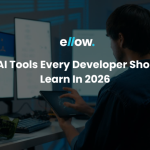What if your next groundbreaking idea wasn’t born in a boardroom, but from an algorithm?
Yes, that’s true! Generative AI is no longer a futuristic concept; it’s a powerful tool creating a myriad of opportunities for businesses. This transformative technology is rapidly reshaping industries, with the global market expected to soar to $110.8 billion by 2030. With its ability to unlock new ideas and efficiencies, generative AI is proving to be a game-changer for businesses across the board, as it enables them to create, innovate, and solve problems at a scale never seen before.
From lifelike images and personalized marketing campaigns to complex data-driven solutions, Generative AI goes beyond traditional automation by empowering machines to create entirely new content. Industries ranging from healthcare to finance are adopting this technology to enhance efficiency, cut costs, and unlock new possibilities that were once unimaginable. With AI-generated content, personalized customer experiences, and data-driven insights, businesses are tapping into the power of AI to drive innovation and stay competitive in an evolving digital landscape.
However, implementing generative AI at scale requires more than just access to the latest technology—it demands expertise, resources, and constant adaptation to rapid advancements. This is where hiring the best generative AI developers becomes a crucial differentiator. By partnering with skilled AI professionals, businesses can not only accelerate their AI adoption but also tap into the full spectrum of opportunities generative AI has to offer, without the heavy lifting of building an in-house AI team from scratch.
Understanding Generative AI & Why It’s a Game Changer?
Generative AI is an advanced form of artificial intelligence that doesn’t just analyze data—it creates. This technology can generate everything from text and images to music and even complex designs by recognizing patterns in vast amounts of data. By using sophisticated models like neural networks, generative AI enables AI-driven innovation, allowing machines to mimic human creativity. Unlike traditional AI, which follows predefined rules, generative AI taps into algorithmic creativity by learning patterns from large datasets and producing new, human-like outputs. It’s not just about processing information—generative AI is about creating something entirely new, fuelling AI-driven innovation across industries.
But how exactly is generative AI a game changer for businesses today? Its ability to automate content generation and enhance creativity is redefining operational efficiency and customer engagement across various sectors. With generative AI, companies can produce personalized marketing campaigns, develop innovative product designs, and even generate realistic simulations for training and development.
Recent breakthroughs, like OpenAI’s ChatGPT and DALL-E, demonstrate how AI can push creative boundaries, helping companies stay competitive in a rapidly evolving landscape. Statistics reveal that organizations utilizing generative AI experience up to a 40% increase in productivity while reducing costs significantly. This transformation is not merely an upgrade—it’s a fundamental shift in how businesses operate, making it imperative for companies to seek out the best generative AI professionals to navigate this new landscape. By partnering with these experts, businesses can accelerate their adoption of this cutting-edge technology and tap into the vast opportunities it presents.
As industries continue to evolve, those who embrace the power of generative AI will not only stay competitive but also set new benchmarks for innovation and efficiency.
Industry Transformations Powered by Generative AI
Sparking a revolution across industries, generative AI is igniting innovations that elevate both efficiency and creativity. Here’s a look at how it’s transforming key sectors:
1. Healthcare
In healthcare, generative AI significantly improves diagnostics and drug discovery. For example, Insilico Medicine utilizes generative models to identify potential drug candidates, accelerating the development of new medications. Additionally, AI-generated synthetic medical images aid in training radiologists, enhancing diagnostic accuracy.
2. Fashion
The fashion industry is embracing generative AI to create unique designs and optimize inventory management. Stitch Fix, an online personal styling service, uses AI algorithms to analyze customer data, generating personalized clothing recommendations. This not only enhances customer satisfaction but also streamlines inventory management by predicting which styles will sell.
3. Media and Entertainment
Generative AI is transforming content creation in media and entertainment as it enables faster production and fosters creativity, allowing artists to explore new ideas effortlessly. Tools like OpenAI’s DALL-E allow creators to generate images from text prompts, while ChatGPT aids in scriptwriting and brainstorming.
4. Marketing
Revolutionizing the marketing landscape, Gen AI enables brands to deliver hyper-personalized experiences that resonate deeply with consumers, by predicting consumer behavior, guiding marketers in crafting offers and campaigns that are more likely to convert. For instance, Persado uses AI to generate personalized marketing messages that resonate with target audiences, improving conversion rates. This automation helps brands quickly adapt to market changes and consumer preferences.
5. Architecture
Architecture is being redefined by generative AI, which creates innovative designs based on specified parameters. Autodesk’s generative design software enables architects to input constraints like materials and budgets, generating numerous design alternatives that optimize space and sustainability.
Challenges of In-House Generative AI Development
1. Lack of Expertise
Building generative AI models requires a deep understanding of complex machine learning algorithms and access to data science professionals. Many organizations may not have in-house talent with the necessary skills to develop and fine-tune these models.
2. Resource Constraints
Demanding substantial financial investment in both technology and talent, in-house development of generative AI solutions can be resource-intensive. Smaller companies or those with tight budgets may find it difficult to allocate sufficient funds to recruit top-tier talent or purchase necessary infrastructure and software.
For instance, Zynga, the gaming company, had to scale back its AI ambitions due to the high costs associated with building its own data science team and infrastructure. This resulted in missed opportunities in enhancing player engagement through AI-driven personalization.
3. Integration Challenges
Integrating generative AI systems into existing workflows and technologies can be complex. Companies must ensure that new AI solutions work seamlessly with legacy systems, which can often be incompatible. This integration issue can lead to significant delays and inefficiencies, particularly for organizations that have extensive legacy systems.
4. Ongoing Maintenance and Adaptation
AI models require continuous training and fine-tuning to stay relevant and effective. Organizations must be prepared for the long-term commitment involved in maintaining these systems, including regular updates and recalibrations as new data becomes available.
Why Outsourcing Generative AI Development is the Key to Success?
1. Cost Efficiency
Outsourcing generative AI development can be more cost-effective than building an in-house team. Organizations can save on salaries, training, and infrastructure costs while still obtaining high-quality AI solutions. According to Deloitte, companies that outsource their AI projects can save between 30-40% compared to internal development.
2. Access to Specialized Talent
It allows companies to tap into a pool of specialized talent with expertise in generative AI, which can be challenging to find and recruit internally. Engaging with top generative AI professionals provides organizations with next-gen skills in machine learning, data analysis, and algorithm development. This access to expertise can dramatically enhance the quality and effectiveness of AI solutions.
3. Risk Mitigation
Experienced external partners in generative AI development can help mitigate risks associated with technology implementation. They are often familiar with potential pitfalls and can implement best practices, reducing the chances of costly mistakes. This can lead to a more successful implementation with less risk to the business.
4. Faster Time-to-Market
Partnering with an external team for generative AI development can significantly accelerate the deployment of AI solutions. Established firms often have pre-existing frameworks and tools that expedite project completion. This speed allows businesses to remain agile and responsive to market demands, implementing innovations more quickly than if they relied solely on in-house resources.
Research from Accenture indicates that organizations leveraging outsourcing can achieve a 50% faster time to market for AI initiatives compared to those relying solely on in-house development. This accelerated pace can be crucial in maintaining relevance in today’s fast-moving industries.
5. Scalability and Flexibility
Offshoring provides businesses with the flexibility to scale their AI efforts based on demand. Companies can quickly ramp up or down resources as needed, adapting to changing market conditions without the overhead costs associated with maintaining a large in-house team. This agility is crucial in the fast-paced AI landscape.
6. Access to Advanced Technology and Tools
With a dedicated outsourcing team, companies can access the latest technologies and tools that may be cost-prohibitive to implement internally. Third-party firms often invest in state-of-the-art software, hardware, and infrastructure, allowing businesses to benefit from advanced capabilities without significant capital expenditure.
How to Successfully Outsource Generative AI Development
Define Clear Objectives: Begin by clearly identifying your project goals and specific outcomes you wish to achieve with generative AI, such as automating content creation, enhancing customer engagement, or streamlining operations.
Choose the Right Partners: Research and select outsourcing partners with proven expertise in generative AI. Look for firms that showcase successful case studies and client testimonials. Engaging with top generative AI professionals can provide valuable insights and innovative solutions.
Establish Strong Communication: Set up regular check-ins and updates to keep all stakeholders aligned. Use collaboration tools like Slack or Trello to facilitate communication and track progress. Clear communication minimizes misunderstandings and ensures that the project stays on track.
Ensure Data Security: With sensitive data involved, prioritize security measures. Ensure that your outsourcing partners comply with relevant regulations and industry standards. Establish clear protocols for data handling and storage to protect your intellectual property.
Cultivate a Collaborative Culture: Foster a culture of collaboration by encouraging knowledge sharing and team integration. Organizing joint workshops and training sessions can enhance relationships and lead to innovative ideas.
Conclusion: The Future of Generative AI in Outsourcing
Generative AI is not just a buzzword—it’s a transformative force reshaping industries and redefining the landscape of creativity, productivity, and innovation. Imagine a world where content creation is automated, customer experiences are finely personalized, and operations run seamlessly. This powerful technology empowers businesses to tap into new growth avenues and respond swiftly to market dynamics.
Outsourcing generative AI development enables organizations to tap into specialized expertise and access pioneering tools without the burden of heavy investments in infrastructure or talent. Companies that embrace this strategic approach can quickly adapt to market changes, scale their operations efficiently, and bring innovative products to market faster, allowing businesses to stay ahead of the curve in an ever-evolving digital landscape.
Are you ready to embark on this transformative journey?
Take the first step today—discover how engaging specialized expertise in generative AI can elevate your organization and propel you into the future. The question is no longer whether to adopt this technology but how swiftly you can integrate it into your strategy for success.






